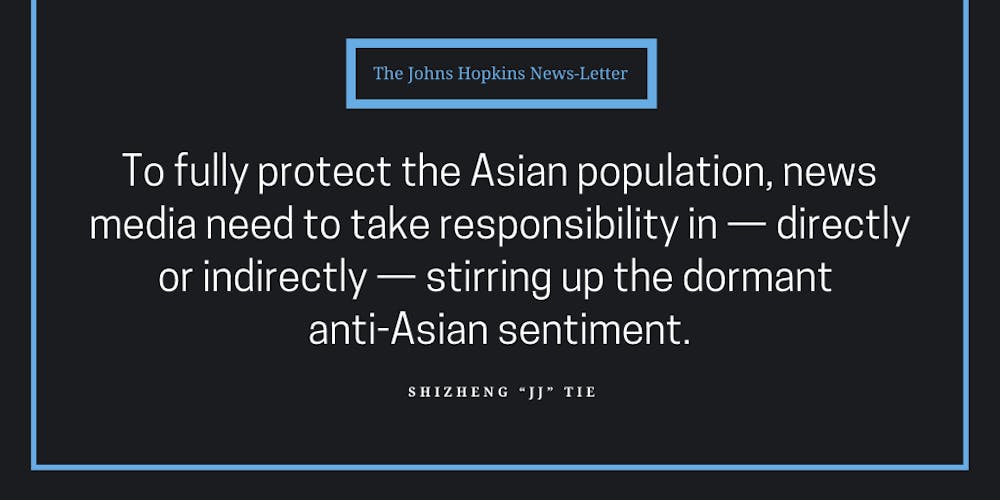It is difficult to discern the exact moment when being Asian felt risky in the U.S. for me. I steered away from controversies that could alienate me from my peers and neighbors, spoke perfect English and occasionally used slang words.
I tried my best to blend into the background, as if staying quiet and invisible could blur the fact that I am an international student, born and raised in China.
It is even more difficult to claim a specific culprit for the hostility that culminated into the anti-Asian violence that has erupted across the United States. Brutal attacks could befall because one had an Asian face in subway station and “didn’t like the way he looked at him” in Chinatown.
Or as the recent tragedy showed, death can visit an innocent spa salon that did nothing wrong. A killer played the sympathy card and pleaded a helpless sex addiction, while the police chief stood with the killer over the victims based on what one can only hypothesize is his own racism.
I have thought too much about being a Chinese international student in the U.S., one of countless students whose life was turned upside down as COVID-19 unveiled dormant sinophobia.
But after extensive research, I distinguish one reason that significantly impacted the growing hostility and intensified U.S.-China relationship: the biased reporting from the media, something driven by profits rather than ideological difference.
The rhetoric of many news outlets in the U.S. prefers taking a condemning perspective when reporting China rather than the unbiased view they claim to have. For example, the New York Times took two polar opposite tones when referring to the Wuhan lockdown as an infringement to human rights versus Italy’s lockdown as a selfless sacrifice for the European economy.
Besides explicitly biased reporting, Western media seem to endorse those who similarly like placing blame on China without substantial evidence. Fang Fang, the author of Wuhan Diary, has received international acclaim even though her book is full of “words of mouth” and stories she “heard from a friend,” many of which have been repudiated by health workers in Wuhan, including a nurse who Fang claimed to be dead. Nevertheless, Fang was heavily praised as a fighter against Chinese government in the mouths of Western media.
It’s not just the big, sensationalized stories that seemingly place China at the position of a villain, but also the more subtle reporting on eating meat, as if China is to blame for the diminishing rainforest. Food waste and carbon emissions are more sizable in developed countries like America.
This is a continuing pattern that I observed for several news media outlets: It is easier to stop at the surface of an issue, domestic or international, than to face up to the real challenges of society. The habit of “agenda setting” replaces delving into the heart of an exhausting problem with no short-term solution.
People may talk about the college scandal of actresses Lori Loughlin and Felicity Huffman, but few are truly ruminating about society’s morbid obsession with brand-name colleges, athletics and cheating to get what you want.
Rightfully believing that minority representation in popular media is the first step to true equality, people condemn the lack of Asian actors in Hollywood as well as the whitewashing culture that misrepresents Asian cultures, one out-of-place white protagonist at a time. But there are more hurtful, detrimental and violent consequences of such stereotypical Asian identities that are too deep and convoluted to be condensed into one news article. The decades of political tug-of-war, economical rivalry and ideological differences that culminated into the heated hour of the recent U.S.-China meeting in Alaska is an example of such consequences.
My eight years in the U.S. were spent in self-scrutiny, trying to blend in and assimilate. And I’m sure it is the same case with millions of Asian Americans, Asian descendants, foreign employees and international students and scholars residing in the United States. They strip themselves of the things that may alienate them; they tell their children and the children of their children to be the “good immigrant” and “be like them.”
But little do they know that even after trying to assimilate, there is still violence and animosity toward Asian populations in America, possibly stemming from decades of biased reporting and stereotypical portrayals of Asian culture (including Hollywood appropriation and the classical Fu Manchu villain).
Flags across the U.S. lowered to show condolence for the Asian lives hurt by racist crimes and discriminating actions. But that is not enough. To fully protect the Asian population, news media need to take responsibility in — directly or indirectly — stirring up the dormant anti-Asian sentiment.
Shizheng “JJ” Tie is a senior from Luoyang, China studying Environmental Engineering. She is a senior class senator in the Student Government Association.





